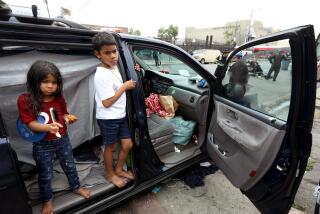A Tough Balancing Act Made More Precarious
Even in the best of times, the tens of thousands of nannies to the Los Angeles well-to-do lead difficult and complicated lives. Their daily journey from apartments in the poorest neighborhoods to jobs in the wealthiest suburbs has always been a long trek.
But now, nannies like Milagro Rodriguez find the trip nearly impossible.
Without the “Nanny Express” and other MTA bus links across Los Angeles’ yawning socioeconomic divide, Pacific Palisades and Malibu might as well be Timbuktu. For Rodriguez, the MTA strike turned the delicate balancing act of survival into a tightrope.
There are the emotional 6 a.m. curbside confrontations with bandit cabbies who want $30 for a one-way ride. The bitter betrayals of fellow nannies who charge $10 for rides in their cars.
On a salary of $64.50 a day, “I can’t afford to go back and forth,” said Rodriguez, who lives near downtown and works in Santa Monica.
“People--even people I thought were my friends--are exploiting the situation,” Rodriguez said. “No one has offered me a free ride.”
Little wonder, then, that Rodriguez and many other nannies have simply surrendered. They are going to their employers’ homes Monday morning and staying there until Friday night, intensifying the strange intimacy between nannies and the employers whose children they care for.
“Nobody likes that. You have no privacy,” Rodriguez said, as she sat in the shade and commiserated with “las babysitters” at a Santa Monica playground amid homes whose median price hovers near $700,000.
“I’m staying in the same room with the child,” Rodriguez said. “We’re all on top of each other. If this strike doesn’t end, las babysitters are going to have to go on strike.”
The sleepovers are just one adaptation to the crisis. On bad days, nannies say, they have forked over the usurious $30 fares--even if it’s two-thirds of a daily wage--just so they don’t get fired by stressed-out parents who need to get to work themselves.
“Some people have lost their jobs,” said Betty Zelaya, a nanny who earns $10 an hour. “Parents can’t wait until they find a way to get there. They hire people with cars.”
Nannies who wind up sleeping at their employers’ homes say that usually means longer workdays. They say the employers treat them as if they are on call from early morning until everyone goes to bed--the reason many immigrant nannies avoid living with their bosses in the first place.
“If you live with them, it’s a 24-hour job,” said Josefina Vicente, who cares for three children for $8 an hour.
Elizabeth Hernandez came from Guatemala three years ago, after her husband died. She earns $250 a week for what used to be five nine-hour days. Since the strike forced her to stay at her employers’ house, her workday has grown to 12 hours. Her English night class back in South Los Angeles is on hold.
For Hernandez, a shy, soft-spoken woman, whose delicate features are dwarfed by big glasses, there is a lot at stake in this $12,000-a-year job. She supports her three children and mother in Guatemala, sending them at least $300 a month. The strike made her abandon her $7-an-hour weekend house cleaning jobs, which netted her an additional $60 to $80 a week--for her, a huge loss.
Juana Margarita Miranda, who is also staying temporarily with her employers, supports four children back in San Salvador--one in college and another in private high school--on a $300-a-week salary. For her, paying some gypsy cabby $20 to $30 for a ride from Van Nuys to Santa Monica is out of the question.
The parents who employ the nannies are also distressed, though less willing to speak on the record. Many are party to a ubiquitous Southern California indiscretion: They are hiring people who are, technically speaking, illegal immigrants.
Homemaker Colleen--”no last name, please”--feels sorry for Lily, who cares for her 3-year-old and her 9-month-old baby. Even before the MTA strike, it took Lily three hours to travel by bus from her Pasadena apartment to Colleen’s Santa Monica home.
Now Lily gets up at 4 a.m. to catch a ride with a friend. She gets to Santa Monica hours early and sits in a diner until her workday starts at 8 a.m.--she doesn’t want to wake the kids. There’s no place for Lily to sleep at Colleen’s except the sofa, and Lily doesn’t want to leave her 18-year-old daughter overnight alone. Last week Lily waited three hours but her ride didn’t show up, so she missed work.
“It’s just been terrible. It’s really hard for her. Maybe if she lived closer I’d pick her up, but I’ve got two kids, and one naps twice a day,” Colleen said. “I’m sure there’s many of them who can’t pay the rent these days.”
Colleen declines to say how much she pays, but she does volunteer that she has decided to get Lily an inexpensive used car. There’s only one snag: a 1994 law requiring a Social Security number to get a U.S. driver’s license, which effectively bars illegal immigrants.
“You need a Social Security number and she doesn’t have one,” Colleen said.
Lily is trying to get an international driver’s license, which would authorize her to drive in the United States for three years. That has meant waiting in long lines at the Department of Motor Vehicles--after paying bandit cabs for a ride there.
Nannies who have driver’s licenses and cars are more highly paid, and they hold all the cards in this Darwinian drama. They are resented, envied and courted.
Consuelo Torres was lucky. When the strike began, a fellow nanny included her in a carpool for a $2 daily gas donation. Her employers--an attorney and a regional business wire editor, Amy Thompson--let Torres begin and end her day a half hour earlier to fit the carpool schedule.
It’s good thing it all worked out. Torres supports three kids on $350 a week. Her monthly rent alone is $600.
The only problem is that her 9-year-old daughter’s school takes a break in October, and she usually comes to work with Torres by bus. Torres pays a woman $40 a week to watch her two older kids after school, and she would like to avoid paying her more for an all-day stay by her daughter.
But that might be the only option, now that Torres rides to work in a highly coveted life raft for desperate souls.
“Usually my daughter comes and we all go swimming and have fun,” Consuelo said, “but I don’t know if there is room for her in the car.”
More to Read
Sign up for Essential California
The most important California stories and recommendations in your inbox every morning.
You may occasionally receive promotional content from the Los Angeles Times.










